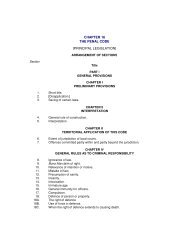9 FAM 40.21(a) Crimes Involving Moral Turpitude - Notes - Criminal ...
9 FAM 40.21(a) Crimes Involving Moral Turpitude - Notes - Criminal ...
9 FAM 40.21(a) Crimes Involving Moral Turpitude - Notes - Criminal ...
You also want an ePaper? Increase the reach of your titles
YUMPU automatically turns print PDFs into web optimized ePapers that Google loves.
U.S. Department of State Foreign Affairs Manual Volume 9 - Visas<br />
In any case where an admission is considered independent of any other<br />
evidence, you must develop that admission to a point where there is no<br />
reasonable doubt that the alien committed the crime in question. (See 9<br />
<strong>FAM</strong> 40.63 N4.3 and 9 <strong>FAM</strong> 40.63 N4.4.)<br />
9 <strong>FAM</strong> <strong>40.21</strong>(a) N6 DETERMINING WHETHER<br />
CONVICTION IS CRIME INVOLVING MORAL<br />
TURPITUDE<br />
9 <strong>FAM</strong> <strong>40.21</strong>(a) N6.1 Provisions of Law Defining<br />
Particular Offense<br />
(TL:VISA-129; 11-09-1995)<br />
Where the record clearly shows the conviction to be predicated on a specific<br />
provision of law, whose terms necessarily embrace only acts that are<br />
offenses involving moral turpitude, the fact that the conviction was so<br />
predicated supports a conclusion that the conviction was of a crime that<br />
involves moral turpitude. Since the ineligibility relates to the conviction of a<br />
crime, rather than a commission of a crime, involving moral turpitude, the<br />
statutory definition of the offense will determine whether the conviction<br />
involves moral turpitude. Each separate provision of law defining an offense<br />
must be read in conjunction with such other provisions of law as are<br />
pertinent to its interpretation.<br />
9 <strong>FAM</strong> <strong>40.21</strong>(a) N6.2 Divisible Statutes Under U.S.<br />
and Foreign Law<br />
(CT:VISA-753; 06-29-2005)<br />
a. If the provision of law on which a conviction is predicated has multiple<br />
sections, only some of which involve moral turpitude, you must evaluate<br />
the nature of the act to determine if the conviction was predicated on the<br />
section of the statute involving moral turpitude. If the divisible statute in<br />
question is part of the law of one of the states you may only examine the<br />
charge, plea, verdict, and sentence in assessing the presence of moral<br />
turpitude in the act for which the conviction was obtained.<br />
b. If the statute in question is foreign, you may assess the presence of<br />
moral turpitude in the act for which conviction has been obtained by<br />
reference to any part of the record or from admissions of the alien.<br />
9 <strong>FAM</strong> <strong>40.21</strong>(a) <strong>Notes</strong> Page 19 of 28





